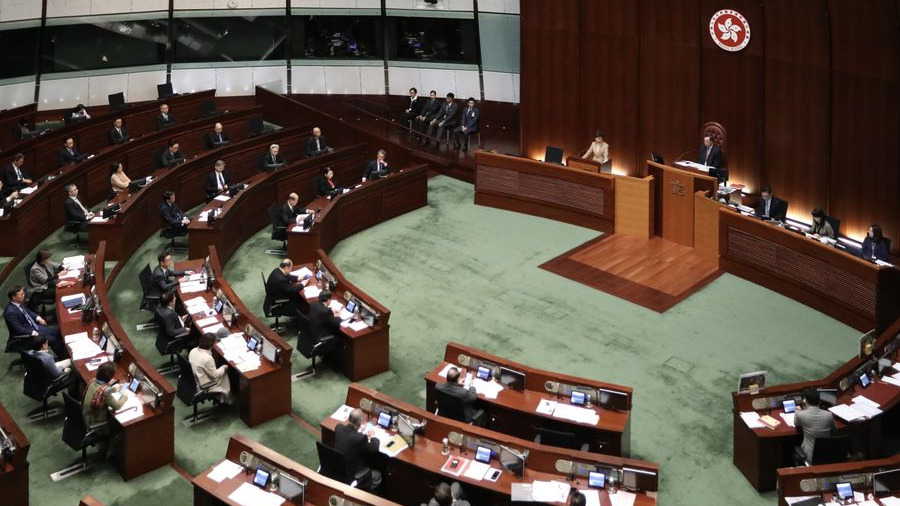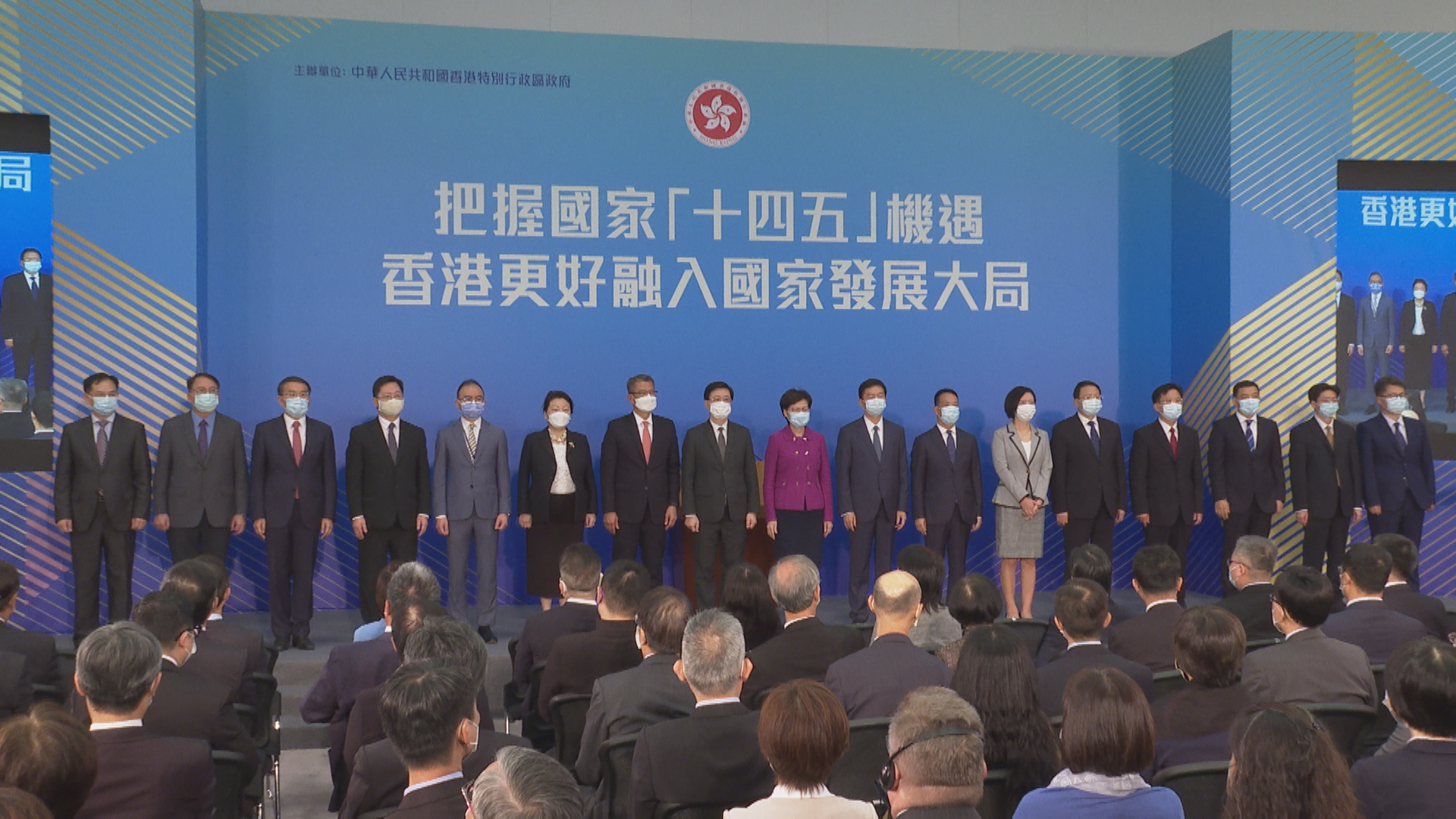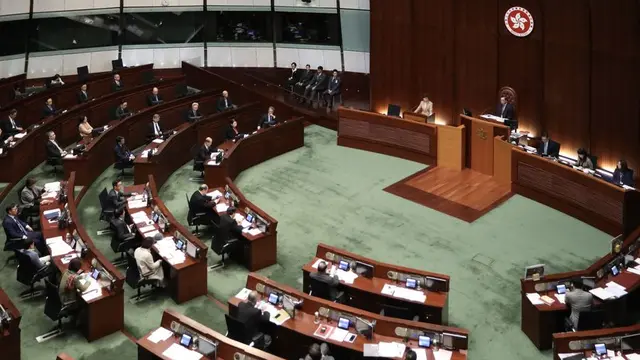
A session underway at the Legislative Council in Hong Kong, China, January 16, 2020. /Xinhua
Editor's note: Grenville Cross is a senior counsel and law professor and was previously the director of public prosecutions of the Hong Kong Special Administrative Region, China. The article reflects the author's opinions and not necessarily the views of CGTN.
Since 1997, the "One Country, Two Systems" policy has been scrupulously upheld by the central authorities. Although malign elements, encouraged by anti-China forces in the West, sought to sabotage the Hong Kong Special Administrative Region (HKSAR)'s unique status, Beijing was unwavering in its determination to maintain its way of life and capitalist system, as guaranteed by the Basic Law.
When, after reunification, difficulties arose, often involving the Legislative Council (LegCo). Some of its members were openly hostile toward Beijing and rebuffed attempts to establish cordial relations, sometimesfor very sinister reasons. In 2019, for example, Civic Party legislators urged the U.S. Congress to impose punitive measures on Hong Kong, as well as on local and national officials, thereby endangering its high degree of autonomy and poisoning relations with the central government.
Inside the LegCo, some legislators resorted to violence, attacked staff members and even sought to prevent it from operating in the manner envisaged by the Basic Law. In the most egregious act of contempt, Civic Party legislator Dennis Kwok Wing-hang, who, as deputy chairman of its House Committee, was required to preside over the election of a new chairman, prevented the committee from functioning at all for over seven months, in 2019-20. This created a legislative deadlock, and, over 17 meetings, Kwok blocked the passage of 14 bills and 89 items of subsidiary legislation, many affecting people's livelihoods. He sought to justify himself by claiming that he had to stop the government from introducing a national security law and a national anthem law, even though the HKSAR was constitutionally obliged to enact both.
Kwok and his allies also blocked democratic progress of any sort. Indeed, when the government brought forward proposals to enable the chief executive to be elected by universal suffrage in 2017, as contemplated by the Basic Law, they voted it down in 2015, complaining it did not go far enough. This, in turn, ended the hopes of greater democratization of the LegCo, despite the progress made since 1997.
Indeed, by 2012, Hong Kong's democratic progress had reached the point at which 35 of its legislative councilors were directly elected by geographical constituencies, which was half the total, and up from 20 in 1998. But, following the election in 2016, problems arose, with some newly elected legislators demonstrating their unsuitability to serve. When, as required by law, they were called upon to swear to uphold the Basic Law and pledge allegiance to the HKSAR, they uttered profanities, staged secessionist stunts and insulted the country, thus earning themselves national contempt.

The first seminar on China's 14th Five-Year Plan is held in the HKSAR, China, August 23, 2021. /CMG
However, this was just a foretaste of what was to come. Once the insurrection erupted in 2019, the Civic Party legislators and their allies whitewashed the excesses of the protest movement, maligned the central authorities and sought to block the laws the government needed to combat the violence. Instead of denouncing the mobs that brought death and destruction to the streets, they tried to demonize the police force, even seeking to block its funding.
But,once four legislators, including Kwok, were expelled from the LegCo for violating their oaths of office, their allies resigned in mass protest, and things immediately began to improve.
Indeed, once the LegCo became dysfunctional, it became clear that something had to be done. The central authorities, instead of despairing over the legislative turmoil, chose to strengthen democratic processes. On March 11, 2021, the National People's Congress concluded that the electoral process system needed improvement to ensure a LegCo capable of providing good governance and composed of legislators who had the country's best interests at heart.
The improvement was duly carried out by the LegCo, and faith is now being restored in its operations. The central authorities can again trust the city's legislators, and this has yielded positive results. In a historic move, a Chinese mainland delegation, led by Huang Liuquan, deputy director of the State Council's Hong Kong and Macao Affairs Office, and comprising officials from the National Development and Reform Commission, the Ministry of Science and Technology, and the People's Bank of China, visited the LegCo on August 23 for a seminar.
In his opening remarks, Huang's delegation briefed legislators on China's 14th Five-Year Plan and explained that it underpinned the HKSAR's financial, trade, aviation, technology, legal and cultural sectors. He said the blueprint would improve their competitiveness and enable them to "merge into the country's overall development." By drawing on the strengths of "One Country, Two Systems," the region's government would, he said, be able to unite its people at "a new starting point in history." The objective was to provide Hong Kong with a better future and give its people a higher quality of living.
In consequence, the legislators will have acquired a better insight into Hong Kong's future role and will have a clearer understanding of its contribution to national development. They will also have been enlightened about the "dual circulation" strategy, which concerns China's development and impact on the HKSAR. In consequence, they will be far better informed in their future discussions with both the city's government and the private sector.
Now that the ice has been broken, exchanges like this, which enrich the legislators' work, will hopefully continue. Quite clearly, the HKSAR has a vital role to play in achieving national imperatives, and its legislators have much to contribute. Having overcome its problems, the LegCo can now be taken seriously and help Hong Kong realize its full potential. Moreover, these exchanges should be built upon going forward and expanded in the national interest.
(If you want to contribute and have specific expertise, please contact us at [email protected].)
 简体中文
简体中文

